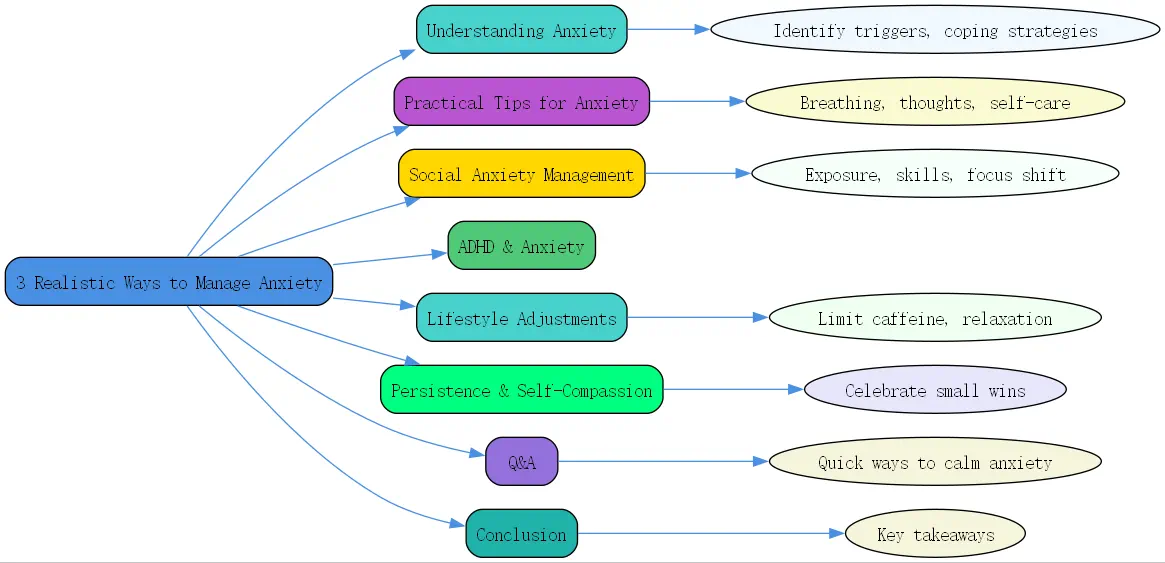Introduction

Anxiety is something many of us face, and it can feel like an unwelcome guest that overstays its welcome. Whether it’s a constant hum of worry, a spike before social events, or stress that won’t let go, managing anxiety is possible with the right tools. At BrainTalking, we’re committed to helping you navigate these challenges. In this guide, we’ll dive into three realistic ways to manage anxiety effectively. These strategies are practical, grounded in expert insights, and adaptable to various forms of anxiety—be it general, social, or even tied to ADHD. Let’s explore how you can take charge and find peace.
Understanding Anxiety: The First Step
Journaling to Identify Anxiety Triggers
To tackle anxiety, you need to know what sets it off. Triggers are unique to each person—maybe it’s a crowded room, a looming deadline, or a nagging thought. Journaling is a simple yet powerful way to uncover these culprits. Grab a notebook and jot down when anxiety hits. What were you doing? How did your body feel? What thoughts raced through your mind? Over days or weeks, you’ll start to see what sparks your anxiety, giving you a map to navigate it better.
Recognizing Patterns and Preparing Coping Strategies

Once you’ve logged your triggers, patterns often emerge. Maybe you tense up every time you’re around new people, or your heart races before meetings. Recognizing these trends is like turning on a light in a dark room—it makes everything clearer. With this insight, you can prepare coping strategies. If social settings stress you out, you might rehearse a few conversation starters. If mornings feel chaotic, a calming routine could help. Understanding your anxiety equips you to face it head-on with tailored solutions.
Practical Tips to Manage Anxiety and Stress
Deep Breathing Exercises for Calmness
When anxiety kicks in, your breath can become your best friend. It’s common to breathe fast and shallow during tense moments, which only fuels the panic. Deep breathing flips that script. Try this: inhale slowly through your nose for four seconds, hold for four, then exhale through your mouth for four. Repeat a few times. This trick calms your nervous system and works anywhere—before a big presentation or even mid-conversation. It’s a quick, realistic way to regain control.
Challenging Negative Thoughts with Cognitive Techniques
Anxiety loves to twist your thoughts into knots. “I’ll mess this up,??or “Everyone’s judging me”—sound familiar? These distortions aren’t facts; they’re just noise. Cognitive techniques help you quiet them. Catch the thought, then question it: “Is this true? What’s the evidence???Often, there’s little to back it up. Replace it with something grounded, like “I’ve handled tough spots before.??This shift takes practice, but it’s a game-changer for managing anxiety and stress over time.
Self-Care: Sleep, Diet, and Exercise
Your body and mind are a team, and self-care keeps them in sync. Skimp on sleep, and anxiety can creep in stronger—aim for 7-9 hours nightly with a steady bedtime. Diet matters too; junk food might spike your nerves, while balanced meals with veggies and protein stabilize you. Exercise is a natural anxiety-buster, releasing feel-good endorphins. Even a 20-minute walk can lift your mood. These habits aren’t flashy, but they’re solid tips to manage anxiety and stress every day.

Ways to Manage Social Anxiety

Social anxiety can make even simple interactions feel daunting, but there are realistic ways to ease that burden. Let’s break it down with strategies that build confidence step by step.
Gradual Exposure to Social Situations
Facing social fears doesn’t mean diving into a crowded party right away. Start small—say hi to a neighbor or chat with a cashier. Gradually step up to tougher scenarios, like joining a group hangout. Each time you do, your anxiety lessens a bit. It’s like training a muscle; the more you practice, the stronger you get. This slow-and-steady approach is one of the best ways to manage social anxiety without overwhelming yourself.
Improving Social Skills: Conversation Starters and Active Listening
Feeling awkward in conversations can amplify social anxiety. Boosting your skills can change that. Practice easy openers like “What do you enjoy doing???or “How’s your day been???Then, really listen—nod, ask follow-ups, and keep eye contact. It’s not about being perfect; it’s about connecting. Try role-playing with a friend first to build confidence. These small tweaks can make social moments less scary and more natural over time.
Shifting Focus to Others
When you’re anxious, it’s easy to fixate on yourself—your racing heart, your shaky voice. Flip that focus outward instead. Ask someone about their day or compliment their ideas. This shift pulls you out of your head and into the moment. It’s a subtle but effective trick; by engaging with others, you distract your mind and often find the interaction flows better. It’s a practical way to ease social anxiety on the spot.
Preparing in Advance for Social Interactions
Uncertainty can fuel anxiety, so a little prep goes a long way. Heading to a gathering? Plan a few topics—maybe a recent movie or a shared interest. Picture yourself chatting calmly. This mental rehearsal cuts down on the “what ifs??that spiral out of control. It’s not about scripting every word; it’s about feeling ready. Preparation can turn a nerve-wracking event into something you handle with more ease.
Seeking Support from Friends, Family, or Professionals
You don’t have to face social anxiety alone. Talk to a friend who gets it—they might share their own tips or just listen. Family can offer a safe space to practice socializing too. For deeper help, a therapist can tailor strategies to you, like cognitive behavioral therapy (CBT). Support isn’t a weakness; it’s a strength that can lighten the load. Seeking it out is a smart move for managing social anxiety long-term.
How to Manage ADHD Anxiety (If Applicable and Expandable)
Anxiety can hit harder if you’re juggling ADHD too, but these core strategies adapt well. Understanding your triggers might mean spotting when distraction or overwhelm sparks worry—journaling can pinpoint that. Practical techniques like deep breathing help in chaotic moments, while tools like planners cut task部分を見せる??ADHD anxiety often ties to feeling out of control, so structured routines can ease that tension. A quick tip: break tasks into small steps and use timers to stay focused. Exercise and sleep remain key lifestyle adjustments here too. For more, a professional specializing in ADHD can refine these approaches for you.
Lifestyle Adjustments for Anxiety Management
Limiting Caffeine and Alcohol Intake
What you consume affects how you feel. Caffeine can jolt your nerves, making anxiety spike—cut back, especially before big moments. Alcohol might seem calming at first, but it can disrupt sleep and worsen anxiety later. Swap that coffee for herbal tea or water a few times a week. These small limits can steady your system and keep anxiety from sneaking up. It’s a realistic tweak with real impact.
Incorporating Relaxation Techniques: Meditation and Yoga
Relaxation isn’t just a luxury—it’s a tool. Meditation, even five minutes of focusing on your breath, can quiet a busy mind. Yoga pairs that calm with gentle movement, releasing tension from your body. Both lower stress hormones, offering a buffer against anxiety. Try a beginner class online or a quick app-guided session [link to relaxation resources]. Over time, these practices build a habit of peace you can lean on daily.
The Importance of Persistence and Self-Compassion
Celebrating Small Victories
Managing anxiety isn’t a sprint; it’s a marathon. Every step counts—like surviving a tough talk or trying a new technique. Celebrate those wins, no matter how tiny. Jot them down or treat yourself to something small. These moments prove you’re moving forward. Recognizing progress keeps you motivated, showing that change is happening, even if it’s gradual. You’ve got this, one victory at a time.
Building Confidence Gradually
Confidence doesn’t bloom overnight, but it grows with effort. Each time you face a fear or use a strategy, you’re stacking up proof you can handle it. Maybe you spoke up once this week—next time, it’ll feel less daunting. Self-compassion is key here; don’t beat yourself up over setbacks. Treat yourself like a friend learning something new. With persistence, that shaky start turns into steady strength.
Q&A Section
Q: What are some quick ways to calm anxiety in the moment?
When anxiety flares up fast, you need fast fixes. Deep breathing is a go-to: inhale for four, hold for four, exhale for four—repeat until steady. Ground yourself with the 5-4-3-2-1 trick: name five things you see, four you can touch, three you hear, two you smell, one you taste. It pulls you back to now. A quick mantra like “I’m okay??can shift your headspace too. Step away if you can, just for a breather.
Q: How can I support a loved one with anxiety?
Helping someone with anxiety starts with empathy. Learn a bit about it—know it’s real, not drama [external link to Anxiety and Depression Association of America]. Listen without fixing; let them vent. Don’t say “just relax”—it’s not that simple. Suggest professional help gently, maybe offer to go with them. Join them in breathing exercises or a chill walk. Above all, show you’re there, steady and patient, through the ups and downs.
Conclusion
Anxiety doesn’t have to run the show. By exploring these three realistic ways to manage anxiety—understanding your triggers, using practical techniques, and adjusting your lifestyle—you’re laying down a path to calm. It’s about small, doable steps that add up. At BrainTalking, we believe in your ability to grow stronger with every try. Start today, be kind to yourself, and watch anxiety shrink from a giant to a guest you can handle.
Key Takeaways
- Journal your triggers to understand what sparks your anxiety.
- Breathe deeply to calm your body in tense moments.
- Challenge thoughts and replace them with realistic ones.
- Ease into social fears with gradual exposure and skill practice.
- Cut caffeine, add yoga for a steadier mind and body.
- Celebrate wins to build lasting confidence.




